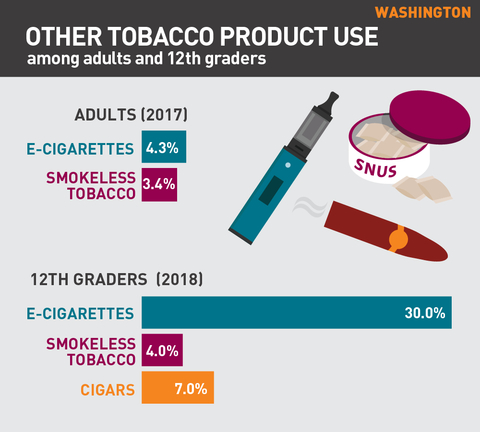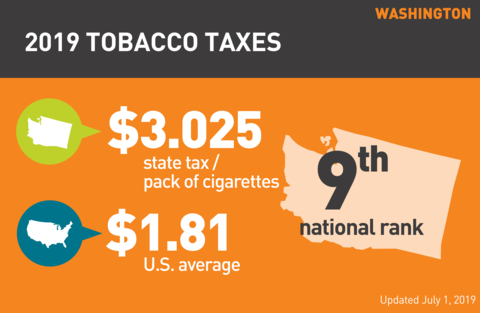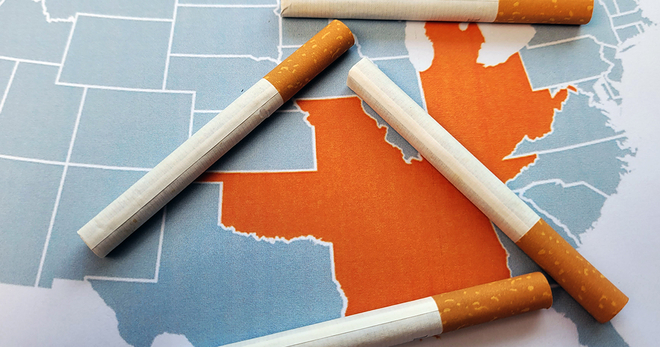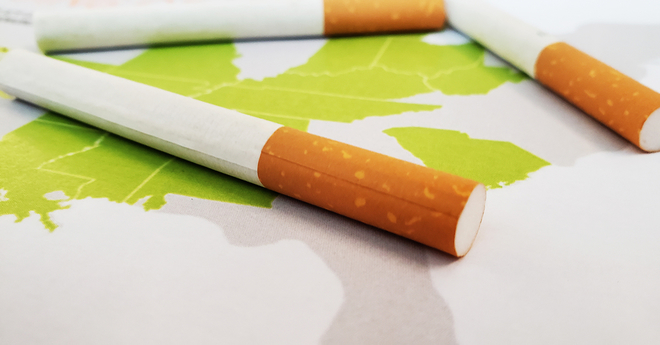Tobacco use in Washington 2019
Cigarette use: Washington
Cigarette use in Washington
- In 2017, 13.5% of adults smoked. Nationally, the rate was 17.1%.1
- In 2018, 8% of 12th graders in Washington smoked cigarettes on at least one day in the past 30 days. Nationally, the rate was 8.8%.2,3
Other tobacco product use: Washington
E-cigarette and smokeless tobacco use in Washington
- In 2017, 4.3% of adults used e-cigarettes and 3.4% used smokeless tobacco.4
- In 2018, approximately 10% of 8th graders, 21% of 10th graders and 30% of 12th graders in Washington used vapor products on at least one day in the past 30 days.2
- In 2018, approximately 1% of 8th graders, 2% of 10th graders and 4% of 12th graders in Washington used chewing tobacco, snuff or dip on at least one day in the past 30 days.2
- In 2018, approximately 2% of 8th graders, 3% of 10th graders and 7% of 12th graders in Washington smoked cigars, cigarillos or little cigars on at least one day in the past 30 days.2
Economics of tobacco use and tobacco control
Economics of tobacco use in Washington
- Washington received $552.6 million (estimated) in revenue from tobacco settlement payments and taxes in fiscal year 2019.5
- Of this, the state allocated $1.5 million in state funds to tobacco prevention in fiscal year 2019, 2.4% of the Centers for Disease Control and Prevention’s annual spending target.5
- Smoking-caused health care costs: $2.81 billion per year.5
- Smoking-caused losses in productivity: $2.2 billion per year.6
Washington tobacco laws
Cigarette tax in Washington
Tobacco taxes
- Washington is ranked 9th in the U.S. for its cigarette tax of $3.025 per pack (enacted May 2010), compared to the national average of $1.81. (The District of Columbia has the highest tax at $4.50 and Missouri has the lowest at 17 cents.)7-9
- Little cigars are taxed at 15.125 cents per cigar. All other cigars are taxed at 95% of the taxable sales price, not to exceed 65 cents per cigar.
- Moist snuff is taxed at the greater of $2.526 or 83.5% of the cigarette tax multiplied by 20 for consumer sized cans or packages that weigh 1.2 ounces or less. Cans or packages that weigh more than 1.2 ounces are taxed at a proportionate rate for each ounce or fractional part of an ounce above 1.2 ounces.
- All other tobacco products are taxed 95% of the taxable sales price.7,8
Clean indoor air ordinances
- Smoking is prohibited in government workplaces, private workplaces, schools, childcare facilities, restaurants, bars, casinos/gaming establishments (tribal establishments exempt), retail stores and recreational/cultural facilities.7,8
- E-cigarette use is prohibited in and on grounds of child care facilities, schools, playgrounds, school buses, elevators, within 500 feet of schools, in indoor early learning facilities, in vehicles used to transport children and outdoors on property during non-business hours in a place that would not be considered a “public place” and at least 25 feet from entrances, windows and vents.10
Youth access laws
- The minimum age to purchase tobacco products in Washington is 21. In December 2019, the United States adopted a law raising the federal minimum age of sale of all tobacco products to 21, effective immediately.
- Establishments are required to post signs stating that sales to minors are prohibited and violators will be punished. The sign must also state that photo ID is required to purchase tobacco products.7
- Minors are prohibited from buying vapor products, including e-cigarettes.7
Local tobacco laws
- Using smokeless tobacco is prohibited at professional sports venues in King County, including Safeco Field, CenturyLink Field and KeyArena.12
Quitting statistics and benefits
Quitting statistics in Washington
- The CDC estimates 51.4% of daily adult smokers in Washington quit smoking for one or more days in 2017.4
- In 2014, the Affordable Care Act required that Medicaid programs cover all tobacco cessation medications.8**
- Washington’s state quit line invests 43 cents per smoker, compared to the national average of $2.21.8
- Washington does not have a private insurance mandate provision for cessation.8
Notes and references
Updated April 2019
*National and state-level prevalence numbers reflect the most recent data available. This may differ across state fact sheets.
**The seven recommended cessation medications are NRT gum, NRT patch, NRT nasal spray, NRT inhaler, NRT lozenge, Varenicline (Chantix) and Bupropion (Zyban).
Fiore MC, et al. Treating Tobacco Use and Dependence: 2008 Update. Clinical Practice Guideline. Rockville, MD: US Department of Health and Human Services. Public Health Service: May 2008.
1. CDC, Behavioral Risk Factor Surveillance System, 2017.
2. Washington State Healthy Youth Survey, 2018.
3. CDC, Youth Risk Behavior Surveillance System, 2017.
4. CDC, Behavioral Risk Factor Surveillance System, State Tobacco Activities Tracking and Evaluation System, 2017.
5. Campaign for Tobacco-Free Kids, Broken Promises to Our Children: a State-by-State Look at the 1998 State Tobacco Settlement 20 Years Later FY2019, 2018.
6. Campaign for Tobacco-Free Kids, Toll of Tobacco in the United States.
7. American Lung Association, State Legislated Actions on Tobacco Issues (SLATI).
8. American Lung Association, State of Tobacco Control, 2019.
9. Campaign for Tobacco-Free Kids. State Cigarette Excise Tax Rates & Rankings. https://www.tobaccofreekids.org/assets/factsheets/0097.pdf.
10. Public Health Law Center. U.S. E-Cigarette Regulation: 50-State Review. http://www.publichealthlawcenter.org/resources/us-e-cigarette-regulations-50-state-review.
11. Campaign for Tobacco-Free Kids. States and Localities that have Raised the Minimum Legal Sales Age for Tobacco Products to 21. https://www.tobaccofreekids.org/assets/content/what_we_do/state_local_issues/sales_21/states_localities_MLSA_21.pdf.
12. Knock Tobacco Out of the Park. https://tobaccofreebaseball.org/.
More in smoking by region
Want support quitting? Join EX Program
By clicking JOIN, you agree to the Terms, Text Message Terms and Privacy Policy.
Msg&Data rates may apply; msgs are automated.




